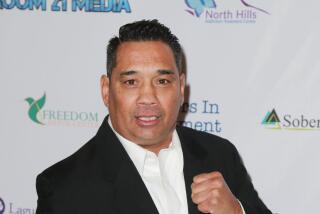Government Lays Claim on Over-Funded Pension Plan
In an unusual action, a Defense Department agency is demanding that the government receive a portion of an over-funded pension plan used by Loral Corp. in acquiring a Newport Beach defense firm from Ford Motor Co. last October, an agency spokeswoman said Wednesday.
The Defense Logistics Agency, which oversees Pentagon contracts, asked in a letter dated Jan. 8 that Loral Aerospace, formerly Ford Aerospace Corp., pay the government its “equitable share” of the pension plan, said Linda Nichols, an agency spokeswoman.
The DLA letter did not specify what amount the government is seeking, but one government source said the claim is a “big chunk” of the amount in question, which could range from $100 million to $300 million.
New York-based Loral Corp., the parent of Loral Aerospace, has until next week to respond to the letter. “We have been in regular discussions with the government” on the excess pension assets, said Elizabeth Allen, a Loral spokeswoman. “Our position is they are not entitled to it.”
Nichols declined to comment on whether the government would go to court to recover the money.
Loral and Ford Motor officials declined to comment on the letter.
The pension fund issue arose last fall when Loral Corp. acquired Ford Aerospace for $715 million. At the time, sources said Loral beat out two other bidders, in part, by allowing Ford Motor to keep $100 million of Ford Aerospace’s pension plan, which was estimated to be over-funded by $300 million. The transaction, in effect, raised the value of Loral’s bid to $815 million.
In November, the DLA complained publicly that Ford Motor Co. had failed to supply necessary information about the pension fund. Shortly thereafter, the company complied with the government’s requests for information.
Loral Chairman Bernard Schwartz has questioned the government’s right to pension assets, but he said that Loral had indemnified Ford Motor against any government attempt to recover pension monies.
By law, a pension fund must have enough funds to meet current and future benefit obligations to employees and retirees. Because of the merger craze of the 1980s, the issue of who gets to keep surplus pension funds when a pension plan is terminated has been the subject of controversy and lawsuits.
In many defense contracts, a portion of the government’s payment to the contractor is specifically earmarked to pay for employee benefits. But the government only recently has begun claiming assets in over-funded pension plans.
More to Read
Inside the business of entertainment
The Wide Shot brings you news, analysis and insights on everything from streaming wars to production — and what it all means for the future.
You may occasionally receive promotional content from the Los Angeles Times.









